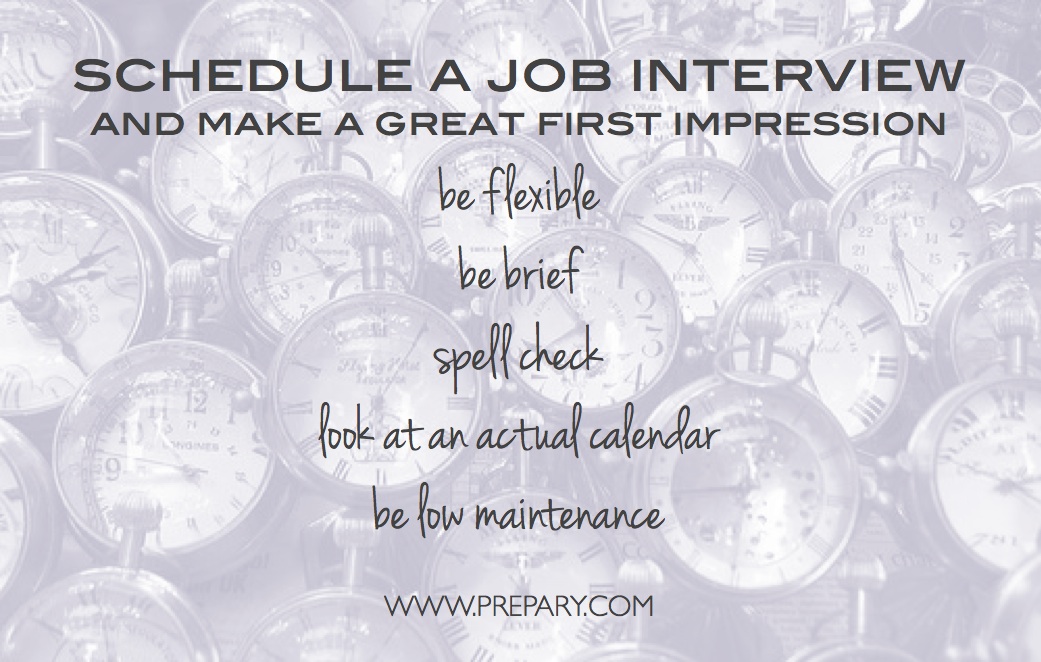Scheduling an interview might seem like a task so simple and mundane that it’s not worth writing about. While on one hand I totally agree, I’ve also seen candidates manage to start off on the wrong foot while doing this. For better or worse, it is the first impression that you are going to make on a recruiter (or whoever is the one scheduling) and it does count for something. So here’s how to schedule a job interview in the best possible way:

Be flexible
While you will have to work within the confines of your own schedule, there must be a certain degree of flexibility. If you are looking for a job, taking time away from other things you are doing is unavoidable. Recruiters and hiring managers work the same exact business hours you do which means you may have to take some time away from the office to accomodate. I’ve had people tell me in the past they could only interview before 8am or after 6pm. Suggesting that means that you are suggesting the person interviewing you must work early or late that day (and do you really want to be the cause of making someone’s day a little longer?)
Be brief
The scheduler doesn’t need to know everything going on in your life that week. Stick to what works and what doesn’t work for you in terms of timing. There aren’t many other details that are needed. Schedulers (whether it is the recruiter, hiring manager, or someone dedicated to scheduling in itself) have a very high volume of people they are setting up meetings for. The less emails that can go back and forth, the better.
Spell & grammar check
It’s not a big deal if you have a minor typo in an email so don’t sweat it. However, really obvious (and plentiful) spelling errors or sentences that don’t make sense are big red flags. A quick proofreading session should do the trick.
Look at a calendar
Make sure you are actually confirming a date that exists (i.e. Friday, August 29th is not a real day since the 29th is a Wednesday). This can cause confusion for obvious reasons. Scheduling with a calendar in front of you is always a good thing.
To put it simply… don’t be high-maintenance or have errors in your communication. That’s pretty much it.
If you live far away, there are some other interesting dynamics to consider. You are going to want to reiterate your current location status (even if it is clear on your resume). What I suggest saying is that you are currently located in X location but are ready and willing to relocate to Y location (the one the company is in). In the meantime, offer to connect via phone or videochat. If you have plans to be in the area in the coming weeks, let the scheduler know that and see if you can come and interview then. However, don’t assume it is necessary to fly in for a first round interview and make that decision on your own. You’ll want to get a little bit more information before spending the big bucks to fly across the country. Some companies may offer to pay for travel, but in a job market like this one, it’s not likely. It is more likely they will opt for someone nearby.
A best practice is…
Always confirming (something people don’t do that often) just to be safe. Send a note the day before saying something along the lines of “I’m looking forward to our meeting tomorrow at [time] at [address]. See you then.” Don’t necessarily ask for a confirmation back or a response – just state that you are confirming and are excited. If there is some type of scheduling issue you will hear back. If you don’t hear back, you’re good to go (no need to send follow up emails).
On the day of…
Make sure you are about 15 minutes early. Being “too early” is actually a real thing so don’t show up with 45 minutes to spare. Since you may be careful to “over-budget” the time it will take to get to the interview, walk around the neighborhood and hang out for a bit before you go into the office (if you find yourself with a lot of time).
Overall, scheduling your interview is not the most important part of the interview process nor will it be the deciding factor (usually) in whether or not you get a job. However, the little things do count and when people evaluate a candidate, they take into account all the interactions, not just the ones that happen in the actual interview.





